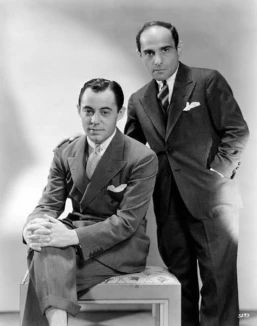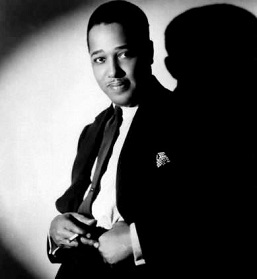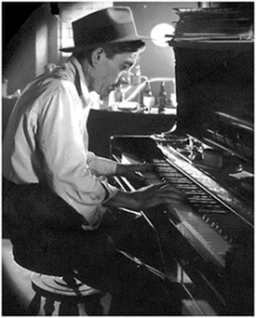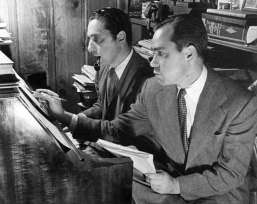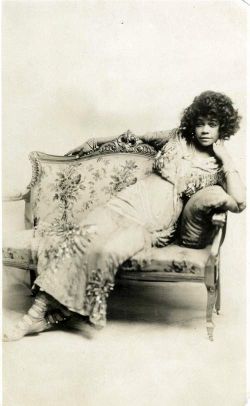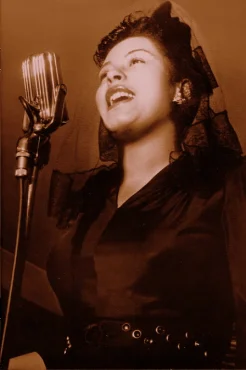Miss Otis Regrets
_______________________
- See also the feature on the German version, Mein Mann ist Verhindert.
Wikipedia page excerpts:
 “Miss Otis Regrets” is a song composed by Cole Porter in 1934, and first performed by Douglas Byng in Hi Diddle Diddle,[1] a revue that opened on October 3, 1934, at London‘s Savoy Theatre.
“Miss Otis Regrets” is a song composed by Cole Porter in 1934, and first performed by Douglas Byng in Hi Diddle Diddle,[1] a revue that opened on October 3, 1934, at London‘s Savoy Theatre.
Cole Porter spent many holidays in Paris throughout the 1920s and 1930s. Ada “Bricktop” Smith was a close friend, and he frequented her nightclub, Chez Bricktop, whose “modern” performing acts certainly influenced or informed the erudite and dense lyrical content of Porter’s songs. However, despite her assertion and references to that assertion in articles by journalists, Porter did not write “Miss Otis Regrets” for Bricktop.[2].The song began during a party at the New York apartment of Porter’s classmate from Yale, Leonard Hanna. Hearing a cowboy’s lament on the radio, Porter sat down at the piano and improvised a parody of the song. He retained the referential song’s minor-keyed blues melody and added his wry take on lyrical subject matter common in country music: the regret of abandonment after being deceitfully coerced into sexual submission. [3] Instead of a country girl, however, Miss Otis is a polite society lady.
Friend and Yale classmate Monty Woolley jumped in to help Porter “sell it”, pretending to be a butler who explains why Madam can’t keep a lunch appointment. In the previous 24 hours, Miss Otis was jilted and abandoned, located and killed her seducer, was arrested, jailed, and, about to be hanged by a mob, made a final, polite apology for being unable to keep her lunch appointment. This performance was so well received that the song evolved, “workshopped” with each subsequent cocktail party, many of which were at the Waldorf-Astoria suite of Elsa Maxwell, to whom Porter dedicated the song. The “smart set” that attended these parties, known to use wit or wisecracks to punctuate anecdotes and gossip, began using references to “Miss Otis” as a punchline. Porter incorporated the tale of “Miss Otis Regrets” into Hi Diddle Diddle later that year.
Among the many artists to record “Miss Otis Regrets” are Ethel Waters, Nat King Cole, Edith Piaf , Ella Fitzgerald, Rosemary Clooney, The Mills Brothers, Marlene Dietrich, and Patricia Barber.
Peggy Johnson and her Orchestra — recorded on 19 July 1934; issued on the single Victor 24691, b/w “The Story of Frankie and Johnny”
.
Ethel Waters — The Discography of American Historical Recordings indicates that two takes recorded in New York City on 20 August 1934, each given Decca matrix #38349, were mastered, and that each of these two masters were issued, under the title “Miss Otis Regrets (She’s Unable to Lunch Today),” on separate versions of the 78 rpm single Decca 140, c/w “Moonglow.” According to 45Worlds.com, Decca 140, featuring “Miss Otis Regrets” on the A-side and “Moonglow” on the B-side, was released in September 1934.
.
In the UK, the same two sides were issued on the single Brunswick 01848
.
Jay Wilbur and his Band, vocal: Sam Browne — released in 1934 on (UK) Rex 8301, as the B-side of “Ole Faithful”
.
Patrick et son Orchestre (dir. Guy Paquinet), featuring Django Reinhardt — recorded, according to the video provider, on 8 March 1935, in Paris
.
The Four King Sisters – issued in 1941 on (US, Canada) Bluebird B-11055, as the B-side of “Whatcha Know JOe) (James Young)
.
Josh White – 1944
.
Edith Piaf – en français – 1946
.
Marlene Dietrich – Mein Mann ist Verhindert – German text by Lothar Metzl
.
Ella Fitzgerald – from Ella Fitzgerald Sings the Cole Porter Songbook, her first album for Verve, also the first in her songbook series.
.
Nat King Cole – 1960
Information from the youtube provider, Nocaro — June 16, 2009:
Although this song was recorded live in the wee hours of the morning of January 14, 1960 at the Sands Hotel in Las Vegas, Capitol Records inexplicably delayed the released of this performance until 1966, a year after Nat had died. This is a bravura vocal on Cole Porter’s classic story of a society lady who kills her lover, is arrested, but then is taken from her jail cell and hung by an angry mob. Her pronouncement before she died was to tell whomever, “Miss Otis Regrets She’s Unable To Lunch Today”. The song itself was written by Porter in 1934 for the London stage play “Hi Diddle Diddle”, and has become a jazz standard recorded by many, but rarely as soulfully as Nat does here.









